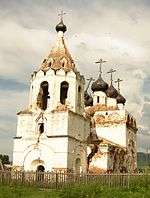Transbaikal
Transbaikal, Trans-Baikal, Transbaikalia (Russian: Забайка́лье, tr. Zabaykalye, IPA: [zəbɐjˈkalʲjɪ]), or Dauria (Даурия, Dauriya) is a mountainous region to the east of or "beyond" (trans-) Lake Baikal in Russia.
The steppe and wetland landscapes of Dauria are protected by the Daurian Nature Reserve, which forms part of a World Heritage Site named "The Landscapes of Dauria".
Etymology and history

The alternative name, Dauria, is derived from the ethnonym of the Daur people. It stretches for almost 1,000 km from north to south from the Patom Plateau and North Baikal Plateau to the Russian state border. The Transbaikal region covers more than 1,000 km from west to east from Baikal to the meridian of the confluence of the Shilka and Argun Rivers.
The ancient proto-Mongol Slab Grave Culture occurred around Lake Baikal in the Transbaikal territory.[1]
In Imperial Russia, Dauria was itself an oblast with its capital at Nerchinsk, then at Chita and became part of the short lived Far Eastern Republic between 1920 and 1922. It is currently divided into Buryatia and Zabaykalsky Krai and makes up nearly all of the territory of these two federal subjects.
Fauna and flora
The region has given its name to various animal species including Daurian hedgehog, and the following birds: Asian brown flycatcher (Muscicapa daurica), Daurian jackdaw, Daurian partridge, Daurian redstart, Daurian starling, Daurian shrike and the red-rumped swallow (Hirundo daurica). The Mongolian wild ass (Equus hemionus hemionus) is extinct in the region.
The common name of the famous Dahurian larch (Larix gmelinii) as well as that of the Dahurian buckthorn (Rhamnus davurica) are also derived from the same source.
Geography
Oktyabrsky (Октябрьский) village, Amur Oblast, near the Russia-China border is a large site of uranium mining and processing facilities.[2]
Part of the area is protected by the Dauria Nature Reserve.[3]

See also
References
- History of Mongolia, Volume I, 2003
- Shandala N, Filonova A, Titov A, Isaev D, Seregin V, Semenova V, and Metlyaev EG (2009), Radiation situation nearby the uranium mining facility, Environmental section poster P.9, 54th Annual Meeting of the Health Physics Society, 12-16 July 2009, Minneapolis, MN, USA.
- "The exhibition "Iris Russia"". flower-iris.ru. Retrieved 23 January 2015.
- Kropotkin, Peter; Bealby, John Thomas (1911). . In Chisholm, Hugh (ed.). Encyclopædia Britannica. 27 (11th ed.). Cambridge University Press. pp. 169–170.